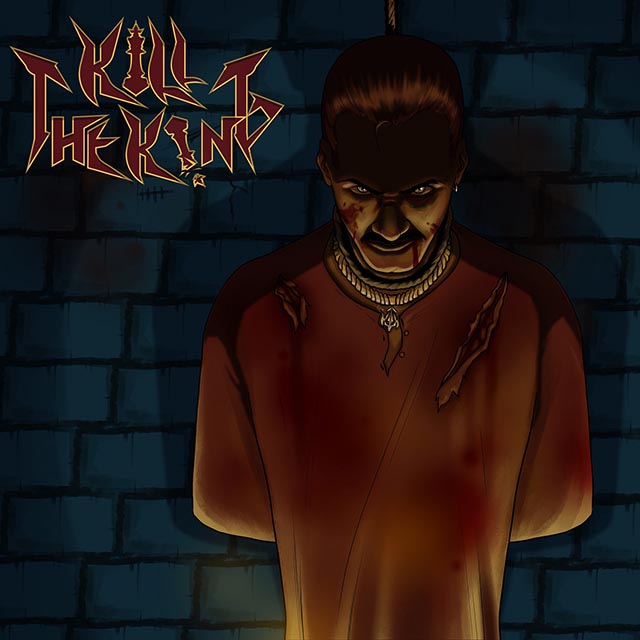
Indian thrash metal group Kill The King are set to release their debut self-titled album tomorrow (3rd). Formed in 2016 by guitarists Aditya Swaminathan and Rishikesh Dharap, the band solidified its lineup in 2021 and gained prominence in the Indian metal scene with two singles. The album, Kill The King, revolves around the theme of resisting injustice and oppression. With nine intense thrash metal tracks, the band addresses societal issues, shedding light on hate, violence, manipulative leadership, and societal injustices. The album delves into the misuse of culture for division and control, along with the relentless cycle of mistreatment. Through powerful instrumentals and vocals. Today (2nd), the group has teamed up with Metal Insider to get an early listen of the record, along with reading a track by track explainer.
Kicking off with the intro “Sirens”, the tone sets off a sense of urgency flowing into the next track, titled “Hate Advocacy.” This song speaks about the hate and violence that people from minority groups face due to the sole reason of being different from the masses in some form or another. Hate crimes against minority groups, transgender and homosexual people, people from different races, etc. are some of the ideas touched upon in this track.
The track “Money Talks” delves into the theme of an unending cycle of societal injustices, where a broken system disproportionately benefits the wealthy and powerful. The lyrics expose the pervasive influence of money, which taints the morals, priorities, and actions of those in authority. The song critiques the erosion of justice and the manipulation of causes for personal gain, reflecting a world where transparency is elusive and the common masses are left unaware of the true beneficiaries. The verses vividly describe a bleak reality where even those meant to uphold justice can be swayed by greed, leaving ordinary people voiceless and oppressed. The repeated refrain of “Cuz money talks” serves as a powerful reminder of the pervasive impact of wealth on every aspect of society.
These song lyrics for “Freedom” passionately address issues of governance, deception, and inequality. The verses vividly depict a scenario where leaders manipulate and deceive, with a disregard for the needs of the people they serve. The lyrics emphasize the struggle for change, portraying the slow pace of promises fulfilled and bills passed only to align with the leaders’ interests. The song sharply criticizes the suppression of free speech and the manipulation of beliefs, drawing attention to the insidious impact of patriarchy and control systems. It paints a picture of a nation led by individuals lacking in character and highlights the disconnect between representation and truth. The concept of “Freedom” is juxtaposed, showing how it’s granted to the privileged and powerful while the common people are left struggling. The lyrics also emphasize the division within society, fueled by misinformation and manipulation, leading to a call for unity and truth-telling. Overall, the song lyrics powerfully convey a call for change, speaking out against injustice and the need to reclaim control over governance and representation.
“Abuse” is an evocative and unfiltered exploration of the dark underbelly of society. Through poignant lyrics, the song unveils a chilling reality where individuals grapple with the relentless cycle of mistreatment, be it from family, systems, or those in power. The composition unflinchingly exposes the erosion of justice, with hypocrisy thriving and democracy waning. Amidst despair, the lyrics narrate a harrowing journey of silenced voices, where victims find themselves trapped in a vicious loop of suffering and manipulation. The chorus stands as a powerful indictment of a world devoid of morality, where the struggle for escape and justice feels insurmountable. “Abuse” delivers a poignant message, shedding light on the pervasive darkness that persists despite desperate attempts to break free.
The essence of “No Country for Women” is captured in its name — a concise instrumental piece that vividly portrays the pervasive violence and injustice endured by women in India. The instrumental format was chosen deliberately, a silent outcry against the plight of women facing these challenges daily. The absence of lyrics reflects a poignant decision by the band, emphasizing that only those directly affected can truly convey the depth of this issue. The track stands as a haunting tribute to the silenced voices, echoing the unspoken struggles and demanding awareness in a society where women’s struggles are oft overlooked.
“In the Name of Culture” is a thought-provoking composition that delves into the paradoxical nature of cultural identity. The song confronts the pervasive misuse of culture as a tool for division and oppression. It vividly captures the somber reality where societal norms and traditions are exploited to suppress individuality and perpetuate fear. The lyrics highlight the silencing of dissenting voices and the reluctance to address deep-rooted issues, painting a picture of a world where standing up for justice often comes at a great personal cost.
The chorus serves as a powerful refrain, questioning the motives behind the manipulation of culture. The song scrutinizes the incongruity between the true essence of culture – rooted in love and respect – and the unfortunate reality of its misuse to fuel discrimination. “In the Name of Culture” is a call for introspection, urging listeners to challenge harmful practices and strive for a more inclusive and compassionate world.
“Regicide” is an intense and confrontational composition that cuts to the heart of societal corruption and abuse of power. The song fiercely condemns generations of wrongdoing, highlighting the relentless cycle of whitewashing and manipulation that has perpetuated suffering. The chorus stands as a rallying cry for justice, calling for the overthrow of oppressive authority figures who have exploited their positions for personal gain.
The lyrics dissect the intricate layers of societal division, revealing a system that thrives on exploiting differences and sowing discord. The song passionately exposes the calculated strategies used to maintain control, from religious bias to gender inequality. “Regicide” is an unapologetic anthem that demands accountability and dismantles the facade of false heroism. It’s a call for radical change and a rejection of apologies that fail to address the deep-rooted injustices, and also acts as the title track of the self-titled Album.
The concluding song titled “Dystopian Reign” paints a chilling tableau of a nation’s descent into bleak despair under the weight of corrupt authority. The lyrics unveil a haunting transformation from a once-proud society to a lawless existence, where victims struggle for survival. The song serves as a poignant commentary on the dangers of collective ignorance, as malicious forces manipulate and play with power. The absence of protection, rights, and voice stands starkly depicted, while the chilling imagery of a noose tightens its grip.
The lyrics reflect a world succumbing to violence and decay, as the populace becomes ensnared in the clutches of a deteriorating system. The vivid description of death, disease, and vultures amplifies the sense of hopelessness and despair. Amid this darkness, a new dawn emerges, ushering in an inevitable fate of submission and tyranny. “Dystopian Reign” is a stark reminder of the consequences of unchecked power and serves as a cautionary tale of how a nation’s pride can crumble into disgraceful ruin.













